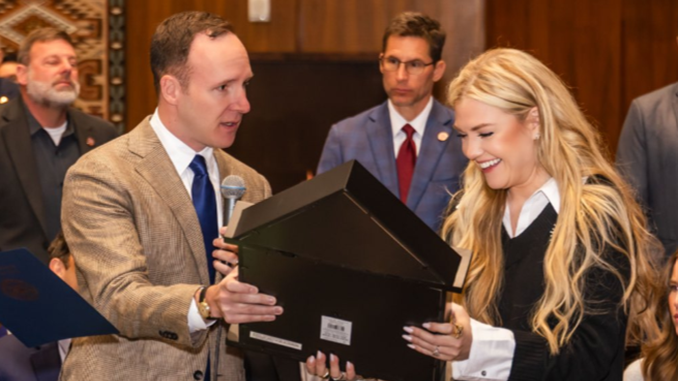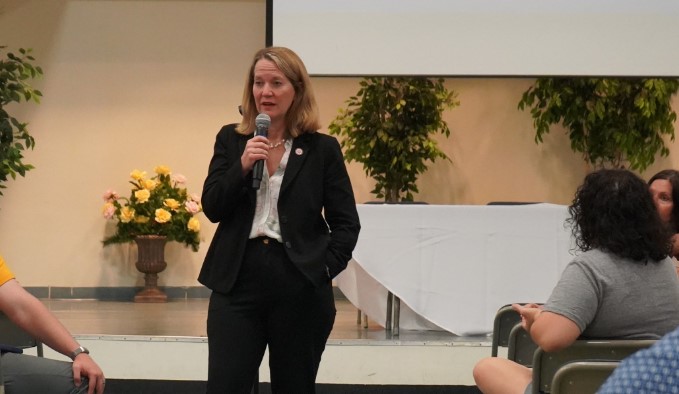
by Ethan Faverino | Feb 5, 2026 | News
By Ethan Faverino |
Arizona State Senator Janae Shamp (R-LD29) has introduced legislation to safeguard patients and local pharmacies from the growing influence of “corporate middlemen” in the prescription drug market.
Senate Bill 1545 prohibits pharmacy benefit managers (PBMs) from owning or holding any direct or indirect interest in retail pharmacies in Arizona. The bill addresses a fundamental conflict of interest that allows PBMs—mediators between insurers, drug manufacturers, pharmacies, and patients—to steer prescriptions to their affiliated pharmacies, under-reimburse independent competitors, drive up costs, and reduce patients’ choice.
“Arizonans deserve transparency and fairness in their prescription drug costs,” stated Senator Shamp. “PBMs were created to manage benefits — not to own pharmacies, control the rules, and profit off the entire system. PBMs were never meant to be both the referee and the player.”
PBMs control key aspects of prescription drug access, including which medications are covered, where prescriptions can be filled, and the reimbursement rates to pharmacies. When PBMs own pharmacies, they can prioritize their own outlets, quietly eliminate local and independent pharmacies, and inflate overall drug costs.
“This bill sends a clear message: our healthcare system exists to serve patients, not corporate profits,” added Shamp. “When the middleman becomes the gatekeeper, prices rise, choices narrow, and local pharmacies are pushed out. SB 1545 ends that self-dealing and puts patients back in control. This bill is about fairness, transparency, and making sure Arizona’s healthcare system works for families — not for corporate executives gaming the system behind closed doors.”
The legislation directs the Arizona State Board of Pharmacy to enforce compliance by revoking or refusing to renew any permits held in violation of this measure.
To protect patient access, the bill establishes safeguards for rare, orphan, or limited-distribution medications that might otherwise become unavailable. The Board is authorized to issue limited-service pharmacy permits in these cases and to convert existing permits as needed for a minimum of 90 days while assessing ongoing market availability. The measure also allows temporary extensions of pharmacy permits for facilities that provide critical services during pending sales to eligible buyers.
The legislation sets a phased implementation, beginning with an initial assessment of all active pharmacy permits as of July 1, 2026. At least 90 days before January 1, 2027, the Board must send written notice to any permit holders reasonably believed to be in violation, and affected pharmacies must then provide written notice to their patients and prescribing providers at least 60 days before the effective date of December 31, 2026.
Ethan Faverino is a reporter for AZ Free News. You can send him news tips using this link.

by Ethan Faverino | Feb 4, 2026 | News
By Ethan Faverino |
The Arizona House of Representatives paid tribute to the life and legacy of Charlie Kirk, founder of Turning Point USA, during a special session at the State Capitol in Phoenix on Thursday, January 29, 2026.
Erika Kirk, widow of Charlie Kirk and current leader of Turning Point USA, was warmly welcomed to the House floor, where she delivered a heartfelt opening prayer. She drew from a Bible verse on Charlie’s desk as she prayed for courage in defending freedom, healing for the nation, integrity in governance, and blessings upon those present.
Following the prayer, a Legislative Proclamation sponsored by State Representatives Teresa Martinez (R-LD16) and Matt Gress (R-LD4) was read aloud in the chamber. Titled “In Recognition of Charlie Kirk on National Freedom Day,” the proclamation honors Kirk’s profound contributions to civic education, constitutional literacy, and public engagement among young Americans.
The proclamation stated, “Charlie believed deeply in this country and in what it stands for. His work expanded opportunities for young people to engage thoughtfully in public life and reinforced the principle that freedom must be renewed by each generation.”
It highlighted Kirk’s role in founding Turning Point USA, which has grown into a national force through campus initiatives, events, debates, and training programs that promote individual liberty and free expression.
Kirk’s efforts, the proclamation notes, align with the ideals of National Freedom Day, observed annually on February 1 to commemorate President Abraham Lincoln’s signing of the resolution leading to the Thirteenth Amendment and the nation’s commitment to liberty and equal justice.
“I’m going to speak from the heart,” expressed Rep. Martinez to Erika Kirk. “For those who knew Charlie, you know the vast void that is left. I ask that all the love we want to give to Charlie be shown to his beautiful wife and family, and that we continue to bless them.”
Rep. Gress added, “Citizenship is not a skill to be learned, but a muscle to be exercised, and Charlie Kirk was one of our best personal trainers in civic responsibility in our generation.”
The lawmakers also presented Erika Kirk with a framed Arizona state flag that had been flown over the State Capitol on behalf of the House in Charlie Kirk’s honor, along with a signed copy of the proclamation.
Ethan Faverino is a reporter for AZ Free News. You can send him news tips using this link.

by Ethan Faverino | Feb 4, 2026 | News
By Ethan Faverino |
The Senate Finance Committee advanced SB 1254 last week. The bipartisan measure, sponsored by Committee Chairman J.D. Mesnard (R-LD13), is designed to strengthen protections for Arizona property owners against deed fraud and related disputes by closing a key loophole in real estate conveyance laws.
The legislation addresses a longstanding gap in state law that has left transfers vulnerable to fraud, confusion, and unexpected ownership changes.
Under current Arizona Law (A.R.S. § 33-401), deeds must be signed by the grantor, notarized, and recorded within specific timeframes. However, there is no explicit requirement to confirm the grantee’s acceptance of the property.
This omission can allow deeds to be recorded without the recipient’s knowledge or consent, potentially enabling fraudulent transfers or leading to costly legal disputes.
SB 1254 amends Section 33-401 of the ARS to require documented acceptance by the grantee before a deed can be recorded with the county.
Acceptance can be demonstrated in ways such as the grantee’s signature (or the signature of their authorized agent, if properly documented in writing) directly on the deed, or a simple certificate or resolution of acceptance attached to or printed on the deed.
The bill provides a sample form for such a certificate:
“This is to certify that the interest in real property conveyed by the deed or conveyance to (name of grantee) is accepted and the grantee consents to the recording of the deed or conveyance.”
“This legislation is about making sure the system works the way people reasonably expect it to,” stated Senator Mesnard. “No one should ever be surprised to learn their property changed hands because of a paperwork loophole. Property rights are fundamental, and this bill reinforces those rights by requiring clear agreement from both sides of a transaction. It’s a straightforward fix that prevents confusion, reduces disputes, and helps guard against fraud, without adding cost or bureaucracy.”
With committee approval secured, SB 1254 now advances to the full Arizona Senate for further consideration. If enacted, the changes would apply to future real property conveyances across the state, providing an additional layer of protection amid ongoing concerns about deed fraud and title issues in Arizona.
Ethan Faverino is a reporter for AZ Free News. You can send him news tips using this link.

by Ethan Faverino | Feb 3, 2026 | News
By Ethan Faverino |
Congressman Abe Hamadeh (R-AZ-08) issued a strong condemnation of Arizona Attorney General Kris Mayes’ recent comments that appear to justify violence against U.S. Immigration and Customs Enforcement (ICE) agents under the state’s “Stand your Ground” law.
Hamadeh described Mayes’s remarks as “reprehensible but entirely predictable,” attributing them to the consequences of placing a “far-left political activist” in the state’s top law enforcement role.
The controversy stems from an interview Mayes gave to 12News anchor Brahm Resnik, where she warned that Arizona’s self-defense laws could lead to a “recipe for disaster” in potential clashes between residents and federal immigration officers.
According to the interview, Mayes suggested that residents could open fire on masked ICE agents if they believe their life is in imminent danger, citing the state’s “Stand Your Ground” law, which permits the use of deadly force in self-defense on one’s property.
“It’s kind of a recipe for disaster because you have these masked federal officers with very little identification, sometimes no identification, wearing plain clothes and masks,” Mayes said during the interview.
She further described ICE agents as “very poorly trained” and emphasized, “We have a Stand Your Ground law that says that if you reasonably believe that your life is in danger and you’re in your house or your car or on your property, that you can defend yourself with lethal force.”
When Resnik sought clarification, asking, “But to be clear, you’re not telling folks you have a ‘license’ if you are threatened, to shoot a peace officer,” Mayes responded, “No, but if you are being attacked by someone who is not identified as a peace officer, how do you know? If somebody comes at me wearing a mask, and I am a gun owner, and I can’t tell whether they are a police officer, what am I supposed to do?”
Hamadeh highlighted that Arizona’s “Stand Your Ground” law does not permit the use of deadly force against law enforcement officers acting in the line of duty.
In the interview, Mayes also vowed to hold federal agents accountable, stating, “We are watching you. If you violate an Arizona law, I will prosecute you.”
Mayes’ office has launched a new webpage encouraging the public to report alleged misconduct by federal agents, including submitting videos and images. “We are encouraging people to send us their videos, and they have every right under the First Amendment to record those videos,” she added.
Congressman Andy Biggs (R-AZ05) blasted Mayes and Governor Katie Hobbs on X.
“It took nearly a week for @katiehobbs to comment on Kris Mayes’ horrendous remarks about shooting ICE agents. Shameful. That’s not leadership and it’s certainly not someone who supports our law enforcement. Arizonans know it shouldn’t take days to speak up for public safety heroes.”
U.S. Rep. David Schweikert (R-AZ-01) echoed concern, blasting only Mayes’ rhetoric as “reckless” in a post on X. “Let’s not pretend this was some careful legal seminar,” Schweikert wrote. “This was the attorney general of Arizona freelancing a scenario where bullets start flying and then shrugging it off as ‘just the law.’ That is reckless on its face. If your job is to enforce the law, you do not go on TV and hand out a permission structure for violence, then act surprised when people hear it as a green light. Words matter. Especially when they come from the state’s top lawyer.”
Ethan Faverino is a reporter for AZ Free News. You can send him news tips using this link.

by Ethan Faverino | Feb 3, 2026 | Economy, News
By Ethan Faverino |
According to the Joint Economic Committee, the United States recorded a total trade deficit of $56.82 billion in November 2025. This figure represented a substantial monthly increase of $27.62 billion from the revised October level, reflecting a sharp widening in the shortfall.
Despite the month-over-month surge, the November deficit stood 27% below the 12-month average, indicating that the broader trend continued to show improvement relative to recent periods.
The rise in the overall deficit was driven largely by developments in goods trade, where the shortfall expanded significantly. The goods trade deficit reached $86.90 billion in November, up $27.92 billion from October, and remained 18% below the 12- month average.
In contrast, the services sector provided a counterbalance, posting a surplus of $30.08 billion. This service surplus rose modestly by $298 million from the previous month and stood 7% above the 12-month average.
Total exports for November declined to $292.05 billion, down $10.87 billion from October, though the figure remained 3% above the 12-month average. Goods exports fell to $185.64 billion, reflecting a decrease of $11.10 billion month-over-month, while services exports edged higher to $106.41 billion, up $237 million.
On the import side, total imports climbed to $348.88 billion, an increase of $16.75 billion from October, yet levels are still 4% below the 12-month average. Goods imports rose to $272.54 billion, up $16.81 billion, while services imports dipped slightly to $76.34 billion, down $61 million.
Compared with November 2024, the November 2025 trade deficit showed improvement, narrowing by 28.75% to $79.75 billion. Exports grew 5.88% year-over-year, while imports declined 1.89% over the same period.
Over the rolling 12 months through November 2025, the cumulative total trade deficit stood at $936.45 billion. This reflected a goods trade deficit of $1.27 trillion, partially offset by a services surplus of $335.80 billion. Total exports during this period reached $3.42 trillion, with goods accounting for $2.19 trillion and services $1.23 trillion. Total imports amounted to $4.35 trillion, including $3.46 trillion in goods and $892.72 billion in services.
Among major trading partners, the largest goods trade deficits over the 12-month period occurred with China, with net exports of -$214.61 billion (representing 17.12% of the total goods deficit), Mexico at -$197.36 billion (15.74%), and Vietnam at -$171.62 billion (13.69%).
The U.S. recorded its largest goods trade surpluses with the Netherlands ($59.99 billion), the United Kingdom ($30.39 billion), and Hong Kong ($26.89 billion).
The leading export destinations were Mexico ($334.37 billion), Canada ($331.25 billion), and China ($110.22 billion), which together counted for 35.84% of total U.S. exports. Oppositely, the top sources were Mexico ($531.73 billion), Canada ($386.75 billion), and China ($324.83 billion), comprising 36.37% of all U.S. imports.
Year-over-year price inflation for exports was 3.29%, with agricultural exports rising 2.64% and non-agricultural exports increasing 3.29%. Import price inflation was notably higher at 7.58% overall, driven by an 8.25% increase in non-fuel imports, while fuel prices declined 1.72%.
Exchange rate movements between November 2024 and November 2025 showed the U.S. dollar weakening against the Chinese yuan 2.7%, the euro 9.6%, the British pound 4.5%, and the Mexican peso 10.5% while strengthening against the Japanese yen 4.6%.
Ethan Faverino is a reporter for AZ Free News. You can send him news tips using this link.





